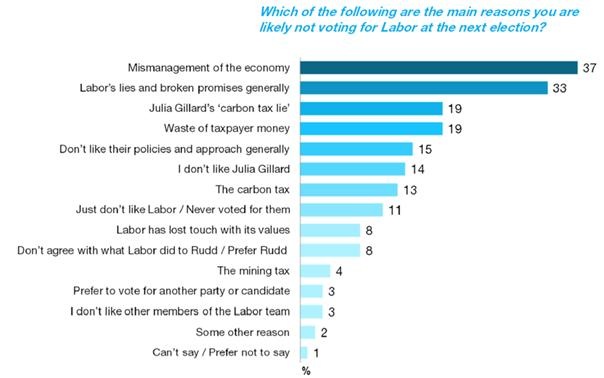A Gillard sacrifice could save the carbon price
The question of who will form government in the next federal election has ceased to be a matter of interest. What matters is the make-up of the Senate.
If things remain as indicated by the current polls, Abbott will face little resistance in repealing the carbon price. Even though he’s unlikely to control the Senate outright, repeal will be enthusiastically supported by fellow social conservatives in Madigan and possibly a member of Bob Katter’s Australian Party.
The only real hope is Senator Nick Xenophon. But he won’t hold the balance of power unless Labor and the Greens can lift their voter support in NSW and South Australia.
Based on polling from JWS Research, if Xenophon does end up controlling the balance of power, Abbott and his colleagues will be confronting a very uncomfortable situation. Yet the polling also appears to indicate Gillard needs to go for this to happen.
This polling, commissioned by the Climate Institute, finds that only 37 per cent of Australians believe the Coalition should repeal carbon pricing if it is elected to government. That is down from 48 per cent in an Ipsos poll in late May 2012, also commissioned by the Climate Institute.
What’s more, if Xenophon were to resist repeal, only 34 per cent support Abbott calling a double dissolution election on the matter. In addition you would expect a large proportion of this 34 per cent is from rusted-on Liberal voters who won’t make any difference to a future election result.
Quite interestingly no demographic group (gender/age group), state or region had a majority backing repeal.
It seems that just like the GST, now that people have experienced the benign reality of carbon pricing, the scare campaign is rapidly losing its potency. If the current trend were to continue, by the time Abbott could call a double dissolution election in late 2014/early 2015, he’ll confront an awful lot of swinging voters who’ll wonder what the fuss is about. This will only be reinforced by US President Barack Obama’s commitment overnight to regulate emissions from existing power stations.
But none of this is actually good news for Gillard. That’s because the same polling results indicate below that while the carbon tax is well down the list of reasons for not voting Labor, the perception that Gillard lied about its introduction is in the top three. Also of note is that the response, ‘I don’t like Julia Gillard’, is above the carbon tax as a reason for not voting Labor.

Source: JWS Polling commissioned by the Climate Institute
One can understand why senior Labor powerbrokers desperately want to avoid rewarding the Rudd camp for its unceasing destabilisation, especially as Rudd’s management skills while PM left a great deal to be desired.
Nonetheless the cold hearted reality is that if Labor really cares about policy rather than personalities it looks like it needs to let Gillard go. Of course this carries no guarantee Labor will rescue its appalling polling situation, but it seems hard to believe things could get worse.
If Labor can deliver Xenophon the balance of power, it looks like he will be in an exceedingly strong negotiating position over repeal of the carbon price. As explained in Xenophon will save carbon trading, Xenophon would be willing to let Abbott repeal the current carbon pricing legislation – but only if it is replaced with another, albeit slightly different, emissions trading scheme. A scheme that Andrew Robb, Greg Hunt and Malcolm Turnbull have all spoken about favourably in the past.
While Abbott is all bravado about going to a double dissolution election now, by late 2014 it will be a different situation.
Double dissolution elections have a history of turning out badly for the incumbent government, while favouring minor players such as Xenophon. Even though it seems inconceivable the Coalition could lose government, several Coalition backbenchers are likely to lose their seats. They will be lobbying for compromise with Xenophon.
In addition big business in reality prefers the certainty and flexibility of keeping an emissions trading scheme in place with generous free permits. They will also be lobbying for compromise.
The difficult budgetary situation also favours dumping the taxpayer-funded Direct Action scheme.
So if:
-- The swinging voters don’t really care;
-- The biggest emitting businesses would prefer an ETS;
-- It helps out the budget;
-- Abbott can save face by repealing the existing carbon pricing legislation (even though it’s replaced by another ETS); and
-- Xenophon’s scheme has the backing of the most savvy members of cabinet on the topic;
then you really have to ask: what’s to be gained by refusing to compromise with Xenophon?
All you’ll be doing is satisfying the ‘global warming is a communist conspiracy’ ideologues who’ll vote Coalition anyway.
Gillard can save the carbon price and an awful lot more of her signature policies, but polling suggests her best chance to do this is if she sacrifices herself.
















